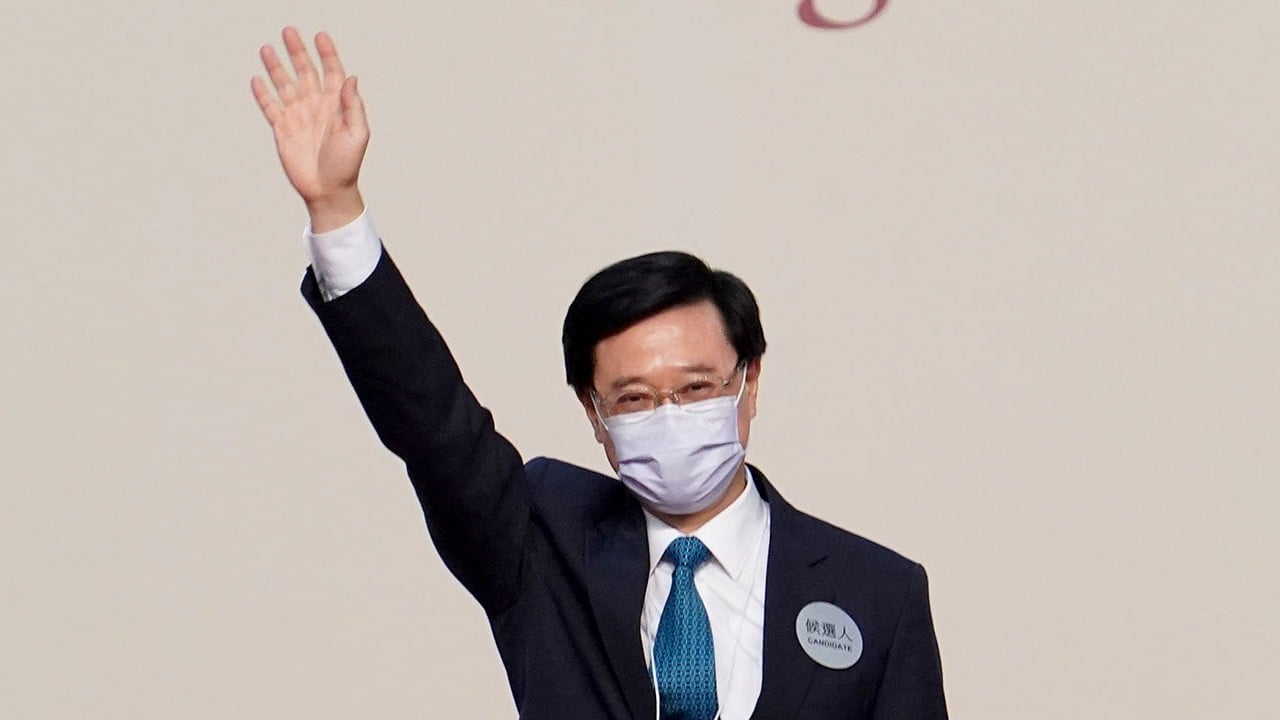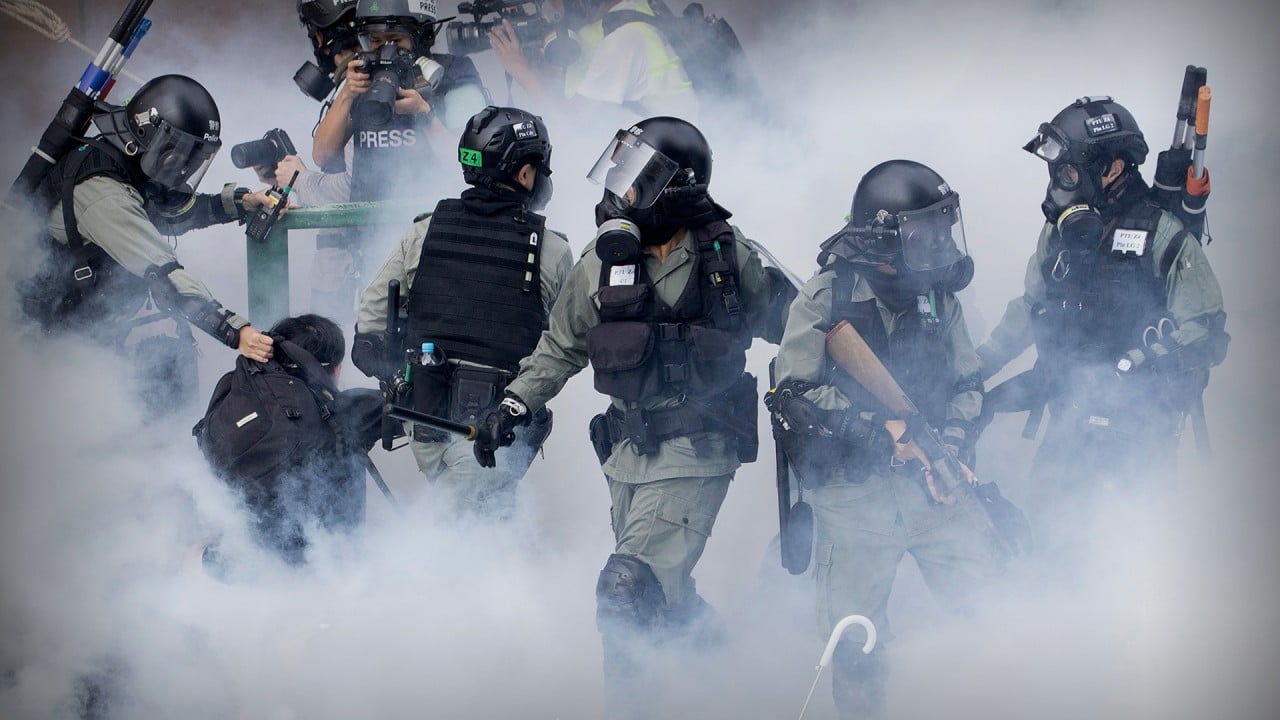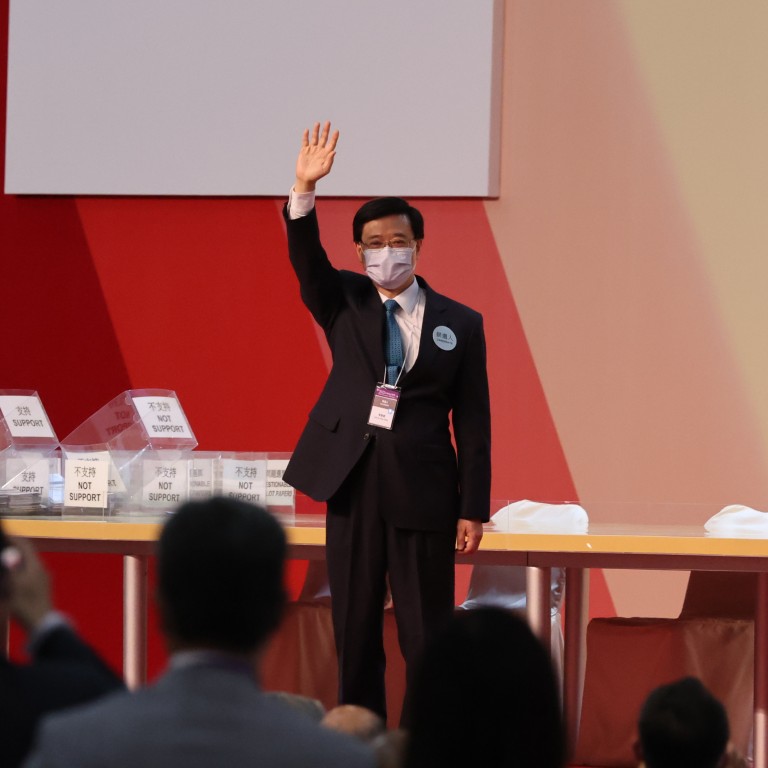
Who is John Lee? Former schoolmates, teachers and colleagues give their measure of the man set to be Hong Kong’s next leader
- Former schoolmates at Wah Yan College, Kowloon recall the boy who aced exams and kept a low profile
- Lee keeps his family out of the spotlight, even old friends say they know nothing about his parents
More than three decades have passed, but former mathematics teacher Norman So Chung-ping remembers his student John Lee Ka-chiu well: “He was very obedient in using the methods I taught.”
Other boys at prestigious Wah Yan College, Kowloon, would attempt creative solutions to the homework So gave them each day, but not Lee.
“Perhaps he knew other ways. But he also knew that the most important thing was to get it done. He really followed the rules,” recalled So, who went on to be principal from 1992 to 2009.
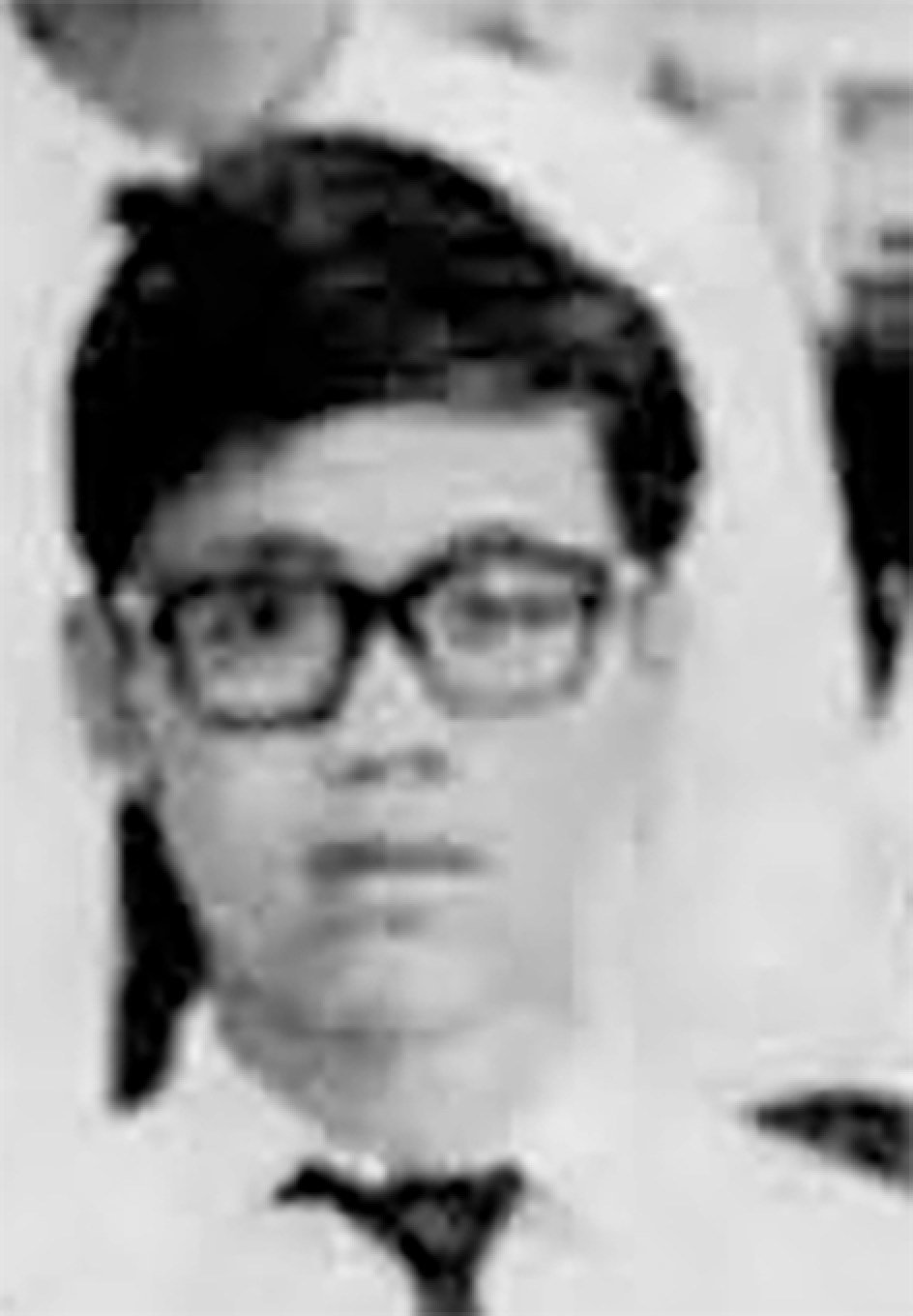
He taught Lee during his matriculation course from 1975 to 1977 and in the end, Lee was among the rare few who scored an A for Applied Mathematics in the Hong Kong Advanced Level Examination.
Several who knew him back then said diligence and the attitude of going strictly by the book offered a glimpse into the origins of Lee’s “result-oriented” philosophy as the 64-year-old prepared to be sworn in as Hong Kong’s fifth chief executive from July 1.
His expected victory came on Sunday, when 1,416 members of the closed circle of 1,461-strong Election Committee backed him. He was the only candidate, and had Beijing’s blessings to run.
Lee’s schoolmates, former teachers and colleagues who spoke to the Post shared their recollections of the schoolboy who became a policeman before emerging as the dark horse and Beijing’s most trusted man to be Hong Kong leader.
He is the second “Wah Yan boy” to get the top job. While he went to Wah Yan College, Kowloon, the city’s second chief executive, Donald Tsang Yam-kuen, attended the school of the same name on Hong Kong Island.
Both are run by the Roman Catholic religious order of Jesuits, and are known for their liberal tradition and allowing students freedom in academic and personal development.
Alumni of the Kowloon school include top professionals, senior counsel and pro-democracy figure Martin Lee Chu-ming, radio host Eric Kot Man-fai and the late actor Kenneth Tsang Kong, who gave up architecture for acting.
Lee spent seven years at Wah Yan College, Kowloon, with its sprawling 41,500-square-metre hillside campus on the fringes of Yau Ma Tei.
His former classmate Keung Yiu-ming recalled that Lee did well enough at the elite school to remain in the top class each year.
“But he kept a low profile,” said Keung, who went on to teach geography and was vice-principal at Wah Yan, Kowloon before retiring in 2018.
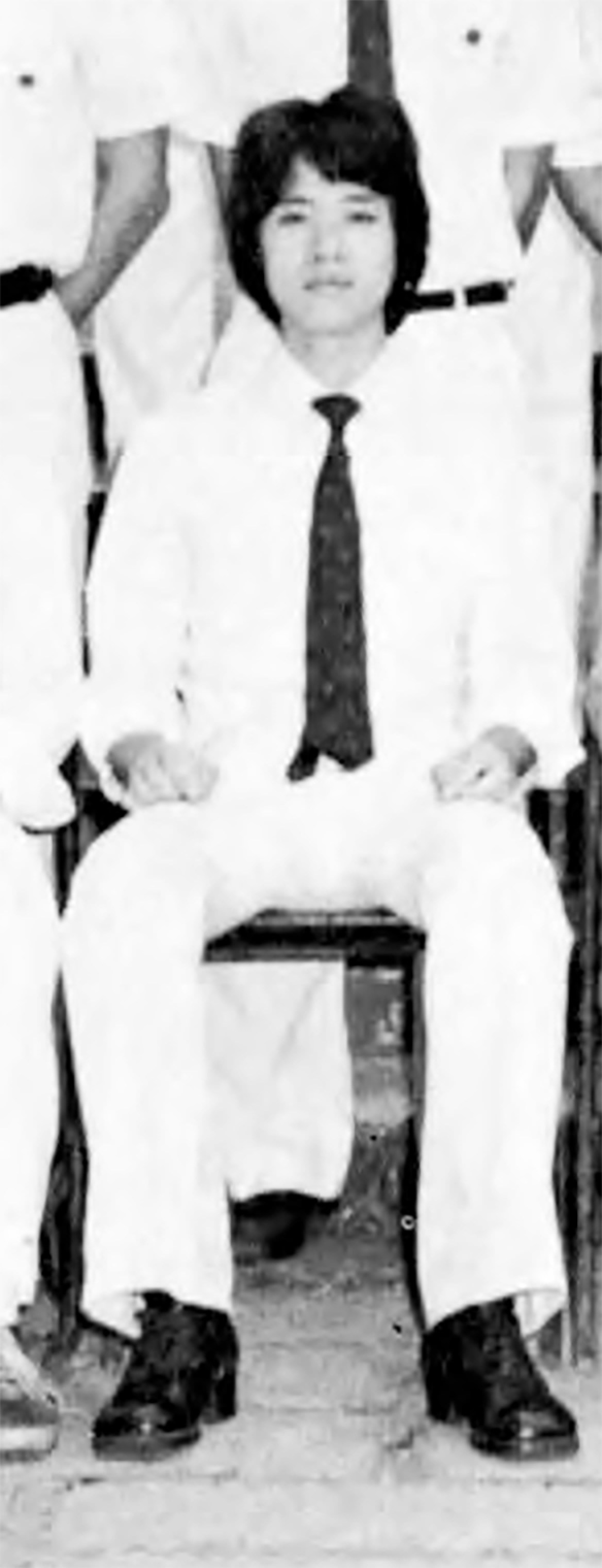
He remembered Lee for his smile, humour and a touch of fashion sense, with his long locks modelled on The Wynners, a popular Cantonese rock band then.
The pair founded an astronomy club, with Lee as a vice-chairman. Keung said Lee was willing to listen, seldom insisting on having his way.
Former director of water supplies Enoch Lam Tin-sing, Lee’s classmate and good friend, said Lee was someone approachable.
“He would talk to people, but he was not exactly the extrovert type,” said Lam, now a board member of Ocean Park.
Some painted Lee in a less positive light, saying that he rarely took an active role in school events.
One classmate, speaking to the Post anonymously, said Lee was particularly involved when their school organised joint parties with girls’ schools such as St Mary’s Canossian College and Good Hope School.
In the Form Five public exams, Lee scored four distinctions, but unlike other top students, did not go on to university after finishing Form Seven.
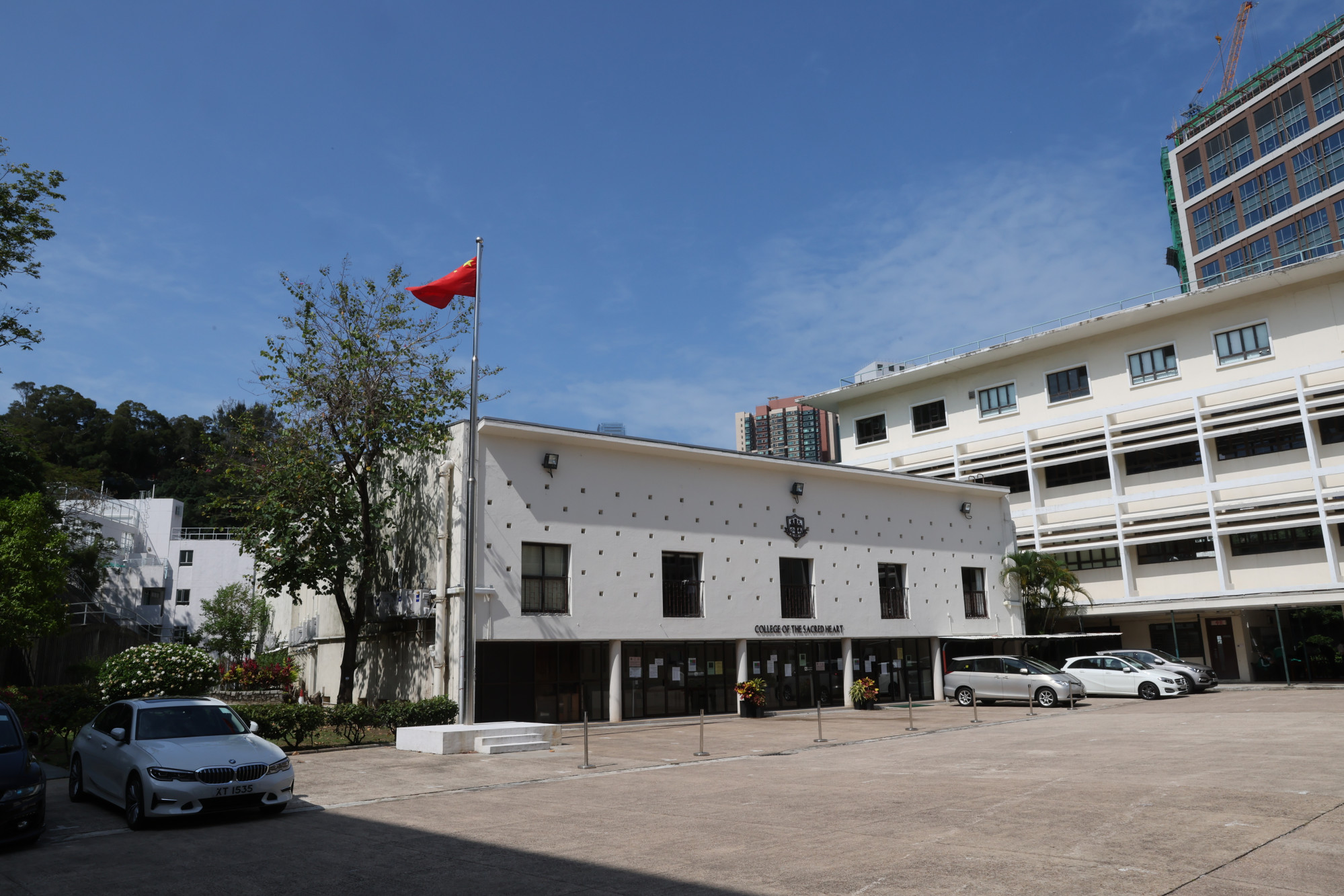
Little known about Lee’s family
One area of Lee’s life where details are scant concerns his family. He has done little to shed light on his parents, his childhood home and growing up years.
Although he attended a Catholic boys’ school, he had long been reticent about confirming his religious beliefs before only recently saying he was a Catholic and only after being pressed twice at press conferences.
During his election rally on Friday, he described himself as being from a humble background. He related how he once got held up while playing with friends near home and when he had no money to give the robber, he “took few punches” to his chest.
He also said he used to live “in an estate”, a colloquial expression in Cantonese to describe a public housing estate.
Yet, he also revealed that his family could afford a little luxury, and had a television set they shared with neighbours, an anecdote meant to show he believed in community, an insider said.
Hong Kong civil servants brace for shake-up under John Lee’s reform
His friend Lam had a vague recollection that Lee lived in To Kwa Wan because they used to walk 45 minutes together from there to school on many mornings.
Once, he and some others were invited to Lee’s home, and Lee played some music on his hi-fi set.
None of Lee’s friends knew much about his parents. One said Lee did not discuss them and even at that time, would choose carefully the topics he wished to talk about.
Despite his good results and earning a place in engineering at the University of Hong Kong, he opted for the police force. He has always maintained that he started working after school because of “family reasons”.
The friend who spoke on condition of anonymity said Lee did not go to university after his girlfriend, Janet Lam Lai- sim, became pregnant. He was 22 when they married in 1980.
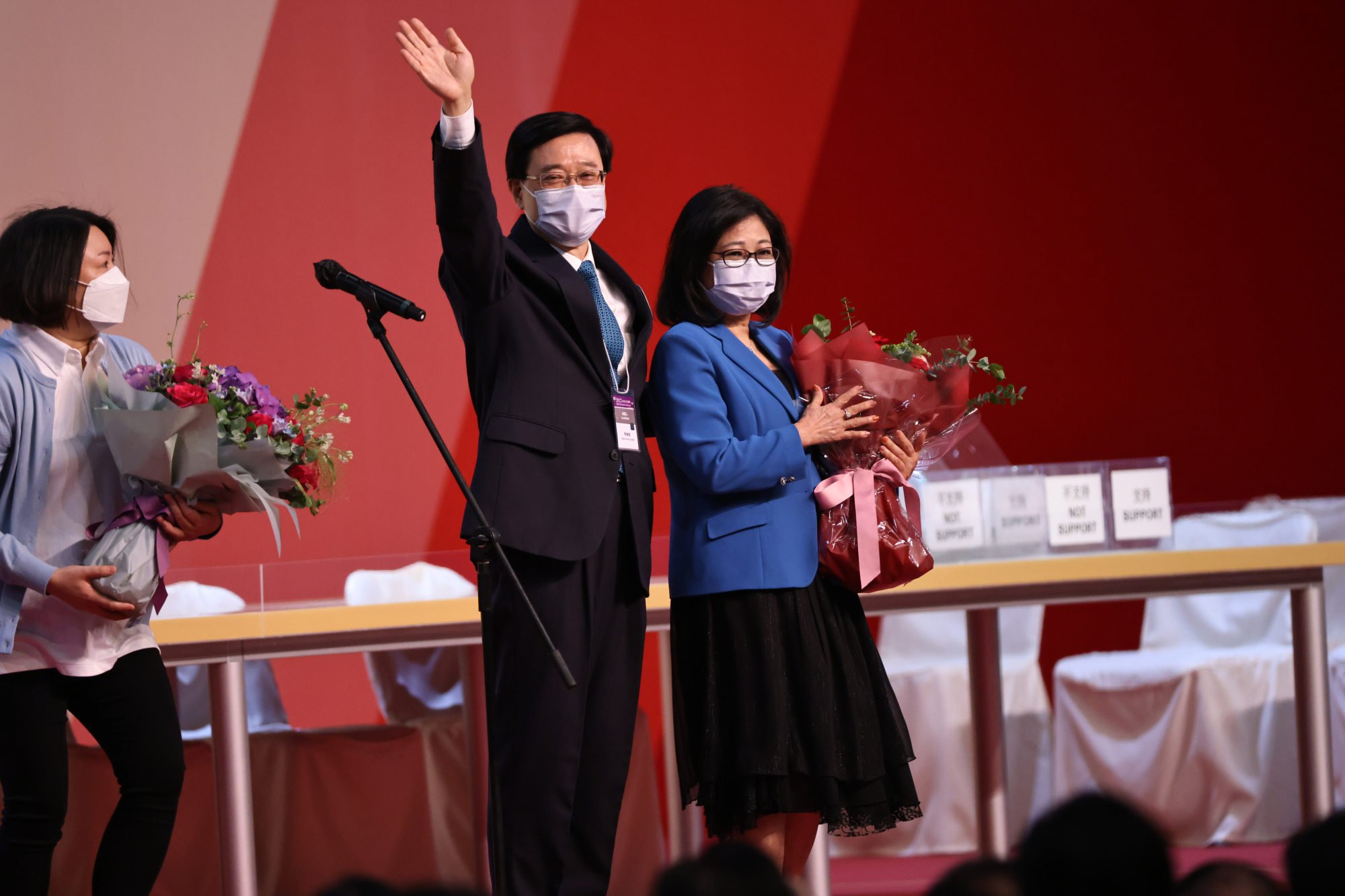
The couple’s two sons, Gilbert Lee Man-lung and Lee Man-chun, also attended Wah Yan College, Kowloon. The older son is a senior bank executive, while the younger is director of an education consultancy in Hong Kong and a firm running kindergartens in mainland China.
So, who was the school’s principal then, when his two sons were students, said Lee would drive to pick up his children after school every now and then with his wife.
Throughout his campaign to be city leader, Lee has kept his family out of the spotlight.
Asked why his family members had not appeared with him, unlike his predecessors, he told journalists during his campaign: “I am grateful to my family. They support me in this election. I love my family and I don’t think I need to tell them I love them every day.”
But after securing his victory on Sunday, he invited his wife on stage to share the “historical moment”.
He fought back tears when thanking her for looking after his family throughout the decades while he was caught up with work.
“I’m just doing what all fathers and husbands would do, to love my family and my wife,” he said, his voice trembling.
From policeman to politician – and disliked alumnus
Lee served the police until 2012, and was a deputy commissioner when he left to join the government as undersecretary for security. He became secretary for security in 2017 and was promoted to chief secretary last year, the first police officer to hold the city’s No 2 post.
During his police career, Lee encountered the case of “evil cop” Tsui Po-ko, who killed a policeman and injured a second one during a three-way fight in a Jordan subway when guns were fired.
Tsui, who was shot five times and died on the scene, left behind a mystery that took weeks to unravel, and Lee was best remembered for cracking the case.
So, the principal, recalled at one point when Lee was overseeing the Yau Tsim Mong district, he would pop over to the school every now and then to provide the latest updates of the crime situation in the neighbourhood.
A police chief inspector, who spoke to the Post anonymously, commended Lee for his leadership skills. He said Lee, then the deputy police chief, led a delegation of Hong Kong disciplined forces to Zhejiang province on the mainland for a visit in October 2011, during which they had a road accident.
A look at the family behind Hong Kong chief executive hopeful John Lee
He said Lee quickly organised the traffic police among the delegates to record details of the accident, putting his managing skills on display and impressing his mainland counterparts.
While the public might view Lee as hawkish, former police commissioner Tang King-shing, who was Lee’s supervisor, said Lee interacted with residents proactively when he was in charge of the force’s public relations.
After he became a politically appointed official, he was remembered as “intelligent, determined and courteous” by undersecretary for Security Sonny Au, who worked with Lee during his tenure as security minister from 2017 to June last year.
Lam, his classmate, recalled reaching out to Lee, then the undersecretary, for help when he had to deal with a sewage repair in Pok Fu Lam as the director of water supplies. Maintenance work was way overdue but blocking off such a busy road network was equally tricky.
He said Lee listened and took the initiative to help out and the maintenance work estimated to be 15 months was shortened to six weeks. “When he thinks it helps the people, he would do it,” Lam said.
Hong Kong candidate calls for opportunities for young jailed protesters
Over his years as office-holder, Lee also gained the moniker “Ip Man”, a Chinese term meaning “asking about every page”, and a play on the name of the late Chinese martial arts master. Lee was such a stickler for detail that he would review all papers sent to him thoroughly, page by page, hence the nickname.
Keung, the former vice-principal, recalled that all the alumni from the police force threw a farewell party for him when he retired in 2018. He remembered Lee assiduously talking to all the young alumni policemen to get to know them better.
Lee was also remembered for being a nostalgic person, fond of harking back to his school days. When Father Harold Naylor, an influential teacher to many Wah Yan students, including Lee, died in 2018, Lee shared his thoughts with the Post. Naylor was a supporter of democratisation in Hong Kong.
“I feel sorry to hear of him leaving us,” Lee said. “He was my teacher of biology and English. I will surely miss him.”
He returned to his alma mater in 2017 for a sharing session with another alumnus, Kevin Yeung Yun-hung, now the secretary for education, before both took up ministerial posts.
Current Wah Yan principal Warren Chung Wai-leung recalled: “The most striking memory I have from that day was that he was sharing his views on learning. He said he observed people around him every day to find their strengths.”
Just a couple of years later, however, Lee became one of the most detested figures among students of his school, after anti-government protests broke out in June 2019 and it was his job as security chief to bring them under control.
At one stage, Wah Yan schoolboys formed a human chain outside their campus to support scrapping the extradition bill, which would have allowed extradition of fugitives to the mainland and which triggered the mass protests.
Political reform not on my agenda: Hong Kong chief executive hopeful John Lee
Both Lee and Yeung, in government, supported the bill. Although it was eventually withdrawn, Lee came under fire for his hardline approach.
A group of alumni issued a statement calling Lee and Yeung the “double shame” of Wah Yan College.
A year later, Lee became the key official responsible for implementing the national security law imposed by Beijing, banning acts related to secession, subversion, terrorism and collusion with foreign forces.
Among the high-profile arrests made since 2019 were Wah Yan alumni in the opposition camp, including former Democratic Party lawmaker James To Kun-sun and veteran barrister Martin Lee, who founded the party.
Will John Lee’s manifesto ‘open a new chapter’ for Hong Kong?
The classmate who spoke anonymously said Lee showed no compassion for the young Hongkongers who took part in the protests. He did not think Lee had what it took to be city leader.
But Lee’s friend Lam said his decades in public service showed that he was “a man for and with others”, living up to the ideals of their school.
Last week, Lee alluded to these ideals. “I am Catholic, I believe what I was taught in my mother secondary school, Wah Yan, Kowloon,” he said, using a mix of the literal translation for alma mater and a colloquial Cantonese reference to “mother school”.
One of the reasons he had been a public servant for more than 45 years, Lee said, was that his life philosophy had been to “help society as a whole”.
Additional reporting by Christy Leung



